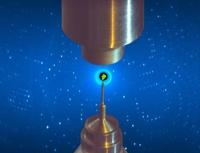Speaker
Description
Neutron spin echo (NSE) spectroscopy provides the ultimate energy resolution in quasi-elastic thermal and cold neutron scattering spectroscopy. In terms of Fourier-time (τ) – or equivalently in terms of the accessible energy (E) – high resolution means the extension of τ (respectively E) into to the regime of μs (neV). The recently upgraded Jülich neutron spin echo spectrometer J-NSE “PHOENIX” at MLZ with its superconducting, fringe-field compensated main precession coils and optimized field shape provides a broad Fourier time range relevant for thermally driven fluctuations in biology and soft matter [1]. The J-NSE “PHOENIX” meets the needs to look into the microscopic dynamics of soft- or biological matter. We present the results on the performance of the spectrometer after the refurbishment and some selected examples from the realm of soft matter dynamics and biology. Recent experiments comprise measurements with the J-NSE of protein domain fluctuations under physiologically relevant conditions [2], membrane dynamics in lipase containing microemulsions [3] or internal dynamics of microgel particles [4] which might be used as functional coatings or drug delivery systems.
[1] S. Pasini, et al., Rev. Sci. Instrum. 90, 043107 (2019)
[2] L. Balacescu, et al., Scientific Reports 10, 1570 (2020)
[3] S. Engelskirchen et al., Frontiers in Chemistry, 8, 613388 (2021)
[4] T. Kyrey, et al., Soft Matter, 15, 6536 (2019)

